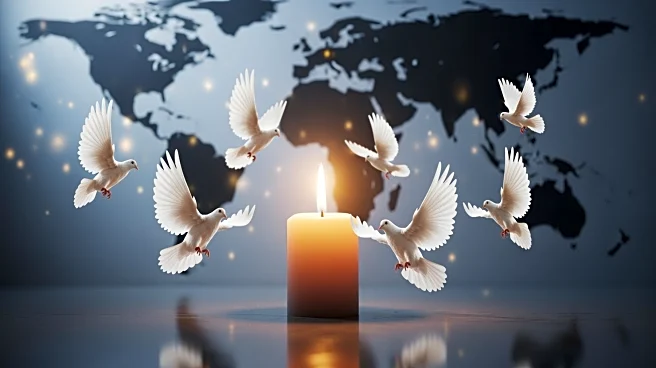What's Happening?
Jewish communities across the United States and the United Kingdom are commemorating the 30th anniversary of the assassination of Yitzhak Rabin, the former Prime Minister of Israel. The World Zionist Organization has organized a global memorial, highlighting
the enduring impact of Rabin's legacy and the peace efforts he championed. The 1993 Oslo Accords, a significant milestone in Israeli-Palestinian relations, were signed in Washington, D.C., with President Bill Clinton overseeing the ceremony. These accords are often remembered as a pivotal moment in the pursuit of peace in the Middle East.
Why It's Important?
The commemoration of Yitzhak Rabin's assassination underscores the ongoing relevance of his efforts towards peace in the Middle East. Rabin's assassination was a turning point that highlighted the deep divisions within Israeli society and the broader geopolitical landscape. The memorials serve as a reminder of the challenges and aspirations associated with peace processes. For the Jewish Diaspora, particularly in the U.S. and U.K., these events are an opportunity to reflect on the historical and contemporary significance of Rabin's vision for peace and the enduring quest for stability in the region.
What's Next?
The commemoration events may prompt renewed discussions on the current state of Israeli-Palestinian relations and the prospects for peace. Stakeholders in the region and international communities might use this anniversary as a catalyst to revisit dialogue and negotiations. The legacy of the Oslo Accords and Rabin's leadership could inspire new initiatives aimed at conflict resolution and cooperation. Observers will be watching to see if these commemorations lead to tangible diplomatic efforts or influence public opinion and policy in the involved nations.
Beyond the Headlines
The assassination of Yitzhak Rabin remains a poignant reminder of the potential consequences of political extremism and the fragility of peace processes. The global memorials not only honor Rabin's legacy but also highlight the ethical and cultural dimensions of leadership and reconciliation. As the world reflects on Rabin's contributions, there is an opportunity to consider the broader implications of his work on current and future peace efforts, as well as the role of international communities in supporting these endeavors.















